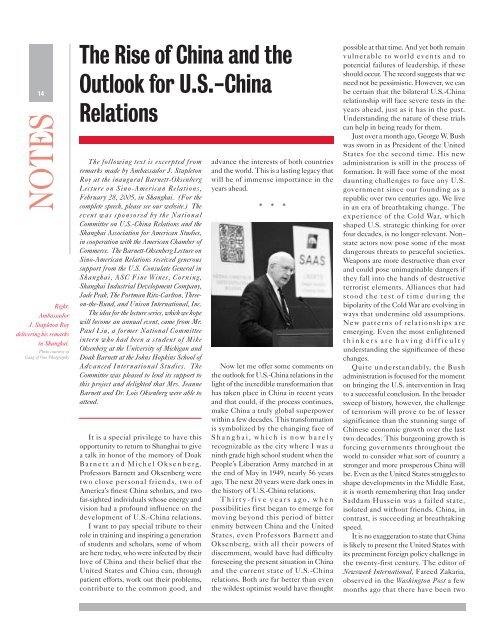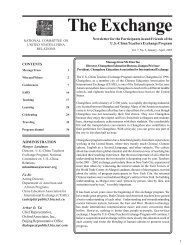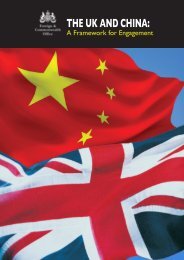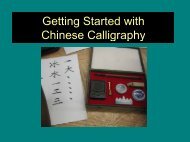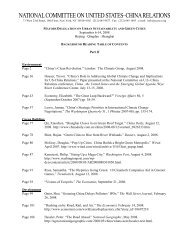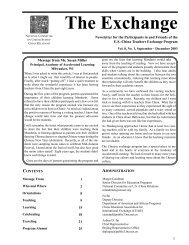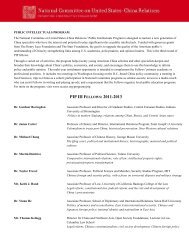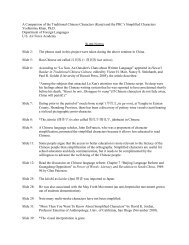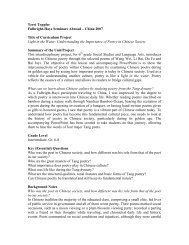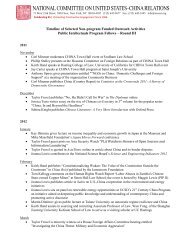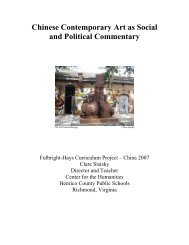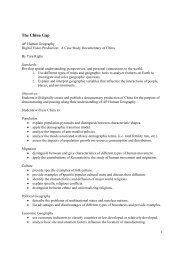New Program - National Committee on United States-China Relations
New Program - National Committee on United States-China Relations
New Program - National Committee on United States-China Relations
Create successful ePaper yourself
Turn your PDF publications into a flip-book with our unique Google optimized e-Paper software.
14<br />
NOTES<br />
Right:<br />
Ambassador<br />
J. Staplet<strong>on</strong> Roy<br />
delivering his remarks<br />
in Shanghai.<br />
Photo courtesy of<br />
Gang of One Photgraphy<br />
The Rise of <strong>China</strong> and the<br />
Outlook for U.S.-<strong>China</strong><br />
Relati<strong>on</strong>s<br />
The following text is excerpted from<br />
remarks made by Ambassador J. Staplet<strong>on</strong><br />
Roy at the inaugural Barnett-Oksenberg<br />
Lecture <strong>on</strong> Sino-American Relati<strong>on</strong>s,<br />
February 28, 2005, in Shanghai. (For the<br />
complete speech, please see our website.) The<br />
event was sp<strong>on</strong>sored by the <str<strong>on</strong>g>Nati<strong>on</strong>al</str<strong>on</strong>g><br />
<str<strong>on</strong>g>Committee</str<strong>on</strong>g> <strong>on</strong> U.S.-<strong>China</strong> Relati<strong>on</strong>s and the<br />
Shanghai Associati<strong>on</strong> for American Studies,<br />
in cooperati<strong>on</strong> with the American Chamber of<br />
Commerce. The Barnett-Oksenberg Lecture <strong>on</strong><br />
Sino-American Relati<strong>on</strong>s received generous<br />
support from the U.S. C<strong>on</strong>sulate General in<br />
Shanghai, ASC Fine Wines, Corning,<br />
Shanghai Industrial Development Company,<br />
Jade Peak, The Portman Ritz-Carlt<strong>on</strong>, Three<strong>on</strong>-the-Bund,<br />
and Unis<strong>on</strong> Internati<strong>on</strong>al, Inc.<br />
The idea for the lecture series, which we hope<br />
will become an annual event, came from Mr.<br />
Paul Liu, a former <str<strong>on</strong>g>Nati<strong>on</strong>al</str<strong>on</strong>g> <str<strong>on</strong>g>Committee</str<strong>on</strong>g><br />
intern who had been a student of Mike<br />
Oksenberg at the University of Michigan and<br />
Doak Barnett at the Johns Hopkins School of<br />
Advanced Internati<strong>on</strong>al Studies. The<br />
<str<strong>on</strong>g>Committee</str<strong>on</strong>g> was pleased to lend its support to<br />
this project and delighted that Mrs. Jeanne<br />
Barnett and Dr. Lois Oksenberg were able to<br />
attend.<br />
It is a special privilege to have this<br />
opportunity to return to Shanghai to give<br />
a talk in h<strong>on</strong>or of the memory of Doak<br />
Barnett and Michel Oksenberg.<br />
Professors Barnett and Oksenberg were<br />
two close pers<strong>on</strong>al friends, two of<br />
America’s finest <strong>China</strong> scholars, and two<br />
far-sighted individuals whose energy and<br />
visi<strong>on</strong> had a profound influence <strong>on</strong> the<br />
development of U.S.-<strong>China</strong> relati<strong>on</strong>s.<br />
I want to pay special tribute to their<br />
role in training and inspiring a generati<strong>on</strong><br />
of students and scholars, some of whom<br />
are here today, who were infected by their<br />
love of <strong>China</strong> and their belief that the<br />
<strong>United</strong> <strong>States</strong> and <strong>China</strong> can, through<br />
patient efforts, work out their problems,<br />
c<strong>on</strong>tribute to the comm<strong>on</strong> good, and<br />
advance the interests of both countries<br />
and the world. This is a lasting legacy that<br />
will be of immense importance in the<br />
years ahead.<br />
* * *<br />
Now let me offer some comments <strong>on</strong><br />
the outlook for U.S.-<strong>China</strong> relati<strong>on</strong>s in the<br />
light of the incredible transformati<strong>on</strong> that<br />
has taken place in <strong>China</strong> in recent years<br />
and that could, if the process c<strong>on</strong>tinues,<br />
make <strong>China</strong> a truly global superpower<br />
within a few decades. This transformati<strong>on</strong><br />
is symbolized by the changing face of<br />
Shanghai, which is now barely<br />
recognizable as the city where I was a<br />
ninth grade high school student when the<br />
People’s Liberati<strong>on</strong> Army marched in at<br />
the end of May in 1949, nearly 56 years<br />
ago. The next 20 years were dark <strong>on</strong>es in<br />
the history of U.S.-<strong>China</strong> relati<strong>on</strong>s.<br />
Thirty-five years ago, when<br />
possibilities first began to emerge for<br />
moving bey<strong>on</strong>d this period of bitter<br />
enmity between <strong>China</strong> and the <strong>United</strong><br />
<strong>States</strong>, even Professors Barnett and<br />
Oksenberg, with all their powers of<br />
discernment, would have had difficulty<br />
foreseeing the present situati<strong>on</strong> in <strong>China</strong><br />
and the current state of U.S.-<strong>China</strong><br />
relati<strong>on</strong>s. Both are far better than even<br />
the wildest optimist would have thought<br />
possible at that time. And yet both remain<br />
vulnerable to world events and to<br />
potential failures of leadership, if these<br />
should occur. The record suggests that we<br />
need not be pessimistic. However, we can<br />
be certain that the bilateral U.S.-<strong>China</strong><br />
relati<strong>on</strong>ship will face severe tests in the<br />
years ahead, just as it has in the past.<br />
Understanding the nature of these trials<br />
can help in being ready for them.<br />
Just over a m<strong>on</strong>th ago, George W. Bush<br />
was sworn in as President of the <strong>United</strong><br />
<strong>States</strong> for the sec<strong>on</strong>d time. His new<br />
administrati<strong>on</strong> is still in the process of<br />
formati<strong>on</strong>. It will face some of the most<br />
daunting challenges to face any U.S.<br />
government since our founding as a<br />
republic over two centuries ago. We live<br />
in an era of breathtaking change. The<br />
experience of the Cold War, which<br />
shaped U.S. strategic thinking for over<br />
four decades, is no l<strong>on</strong>ger relevant. N<strong>on</strong>state<br />
actors now pose some of the most<br />
dangerous threats to peaceful societies.<br />
Weap<strong>on</strong>s are more destructive than ever<br />
and could pose unimaginable dangers if<br />
they fall into the hands of destructive<br />
terrorist elements. Alliances that had<br />
stood the test of time during the<br />
bipolarity of the Cold War are evolving in<br />
ways that undermine old assumpti<strong>on</strong>s.<br />
<str<strong>on</strong>g>New</str<strong>on</strong>g> patterns of relati<strong>on</strong>ships are<br />
emerging. Even the most enlightened<br />
thinkers are having difficulty<br />
understanding the significance of these<br />
changes.<br />
Quite understandably, the Bush<br />
administrati<strong>on</strong> is focused for the moment<br />
<strong>on</strong> bringing the U.S. interventi<strong>on</strong> in Iraq<br />
to a successful c<strong>on</strong>clusi<strong>on</strong>. In the broader<br />
sweep of history, however, the challenge<br />
of terrorism will prove to be of lesser<br />
significance than the stunning surge of<br />
Chinese ec<strong>on</strong>omic growth over the last<br />
two decades. This burge<strong>on</strong>ing growth is<br />
forcing governments throughout the<br />
world to c<strong>on</strong>sider what sort of country a<br />
str<strong>on</strong>ger and more prosperous <strong>China</strong> will<br />
be. Even as the <strong>United</strong> <strong>States</strong> struggles to<br />
shape developments in the Middle East,<br />
it is worth remembering that Iraq under<br />
Saddam Hussein was a failed state,<br />
isolated and without friends. <strong>China</strong>, in<br />
c<strong>on</strong>trast, is succeeding at breathtaking<br />
speed.<br />
It is no exaggerati<strong>on</strong> to state that <strong>China</strong><br />
is likely to present the <strong>United</strong> <strong>States</strong> with<br />
its preeminent foreign policy challenge in<br />
the twenty-first century. The editor of<br />
<str<strong>on</strong>g>New</str<strong>on</strong>g>sweek Internati<strong>on</strong>al, Fareed Zakaria,<br />
observed in the Washingt<strong>on</strong> Post a few<br />
m<strong>on</strong>ths ago that there have been two


